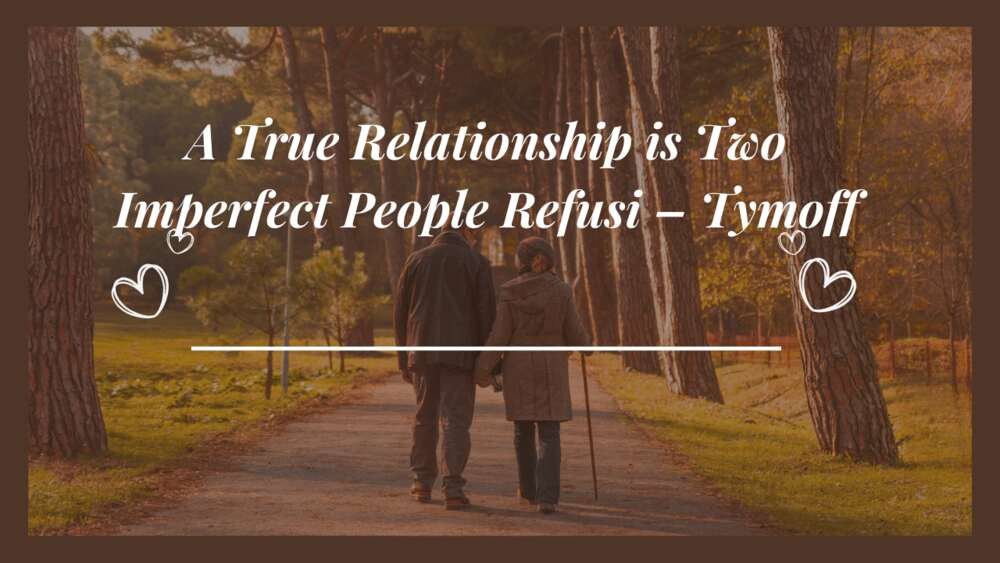A True Relationship Is Two Imperfect People Refusing to Give Up – Tymoff
Introduction “A true relationship is two imperfect people refusing to give up” – a simple yet profound statement often

Introduction
“A true relationship is two imperfect people refusing to give up” – a simple yet profound statement often attributed to Tymoff. This timeless idea reminds us that love isn’t built on flawlessness, but on resilience, understanding, and mutual commitment. In today’s world, where relationships are often idealized on social media, this message is more relevant than ever. The focus keyword, a true relationship is two imperfect people refusi – tymoff, speaks to the real essence of love: not perfection, but perseverance. Real love is about staying together, even when life tests patience, challenges expectations, and exposes each other’s flaws.
Origin and Meaning of the Quote
The quote has been widely shared online and is linked to a philosophical reflection from Tymoff. While Tymoff is not a public figure with a widely documented biography, their quotes have resonated deeply with readers seeking authentic wisdom. The heart of this saying lies in the understanding that two people, each with their imperfections, can still create something beautiful through commitment. It emphasizes that a strong partnership isn’t about avoiding mistakes but about learning from them and moving forward together.
The phrase also challenges the unrealistic standards that romantic media portrays. Instead of chasing a “perfect” partner, it reminds us that the magic lies in working with the person we have chosen, flaws and all. This makes the Tymoff quote both a piece of relationship advice and a grounding reminder for couples of all ages.
The Role of Imperfection in Love
No relationship can ever be perfect because humans themselves are not perfect. Each partner brings their history, habits, strengths, and weaknesses into the relationship. This mixture creates moments of joy, as well as moments of conflict. Recognizing and accepting these imperfections is the first step toward building a healthy connection.
When two people embrace each other’s flaws instead of constantly trying to change one another, they create an atmosphere of acceptance. In such relationships, partners can be their authentic selves without fear of judgment. This authenticity fosters deeper trust and intimacy, as both individuals feel secure in sharing their vulnerabilities. It’s this mutual acceptance that transforms imperfection into one of the strongest bonds a couple can have.
Why Refusing to Give Up Matters
Commitment is easy when everything is going smoothly, but the actual test of love often appears during difficult times. Refusing to give up means choosing the relationship even when challenges arise—whether they are financial struggles, health issues, personal disagreements, or external pressures.
Perseverance in love strengthens emotional resilience. When couples overcome hardships together, they create shared victories that deepen their bond. These moments become a reminder that if they could handle difficulties in the past, they can handle what comes next. Moreover, staying committed demonstrates that love is a deliberate choice, not just a fleeting feeling. This idea aligns perfectly with the Tymoff quote: love is not a fairytale—it’s a daily decision to keep showing up for each other.
Key Elements of a Strong, Imperfect Relationship
Building a lasting partnership as “two imperfect people” requires certain core elements:
- Open and Honest Communication – The ability to share feelings, needs, and concerns without fear of retaliation or misunderstanding. Clear communication prevents minor issues from escalating into significant problems.
- Forgiveness – Holding on to resentment erodes trust over time. Forgiveness is not about forgetting, but about releasing the emotional weight of past mistakes so the relationship can move forward.
- Mutual Respect and Shared Values – While personalities may differ, having aligned values such as loyalty, honesty, and empathy creates a strong foundation for mutual respect and shared values.
These elements work together to create a relationship that can withstand both daily challenges and unexpected life changes.
Common Challenges and How to Overcome Them
Even the healthiest couples face obstacles. Here are some of the most common ones and strategies to manage them:
- Misunderstandings and Conflicts – Address disagreements early before they grow into larger disputes. Use “I” statements instead of accusations to promote productive dialogue.
- External Pressures – Work stress, family interference, and financial struggles can place strain on a couple. Setting boundaries and having a united approach can protect the relationship from outside negativity.
- Life Transitions – Moving to a new city, starting a family, or experiencing a loss can test stability. Being adaptable and relying on one another for support during these times is crucial.
By seeing challenges as opportunities for growth rather than threats, couples can come out stronger on the other side.
Real-Life Examples
Consider couples who have been together for decades—many will admit that their relationship was not free of trials. For example, former U.S. President Barack Obama and Michelle Obama have spoken openly about going through counseling to strengthen their marriage. Similarly, actor Hugh Jackman and his wife, Deborra-Lee Furness, have endured public scrutiny and career pressures, yet their bond remains strong.
These examples demonstrate that longevity in love stems from a commitment to weathering storms together. They reflect the Tymoff philosophy perfectly: a lasting relationship is not built by avoiding hardship but by facing it as a united team.
Practical Tips for Building a Lasting Relationship
Turning the Tymoff philosophy into practice requires intentional effort. Here are strategies couples can use:
- Practice Daily Appreciation – Small acts of kindness and verbal affirmations keep love alive.
- Create Emotional Safety – Let your partner know they can express their true feelings without fear of judgment.
- Make Time for Each Other – In busy lives, scheduling quality time is essential for maintaining closeness.
- Celebrate Growth Together – Recognize both personal and joint milestones, no matter how small.
- Choose Love Daily – Remember that commitment is an ongoing choice, not a one-time promise.
These habits, consistently applied, build a relationship that grows stronger over time.
The Timeless Relevance of the Tymoff Philosophy
The beauty of a true relationship is two imperfect people refusi – tymoff lies in its timelessness. Whether in the past, present, or future, relationships thrive when built on understanding, patience, and resilience. This wisdom applies across cultures and generations because both strengths and weaknesses universally shape human connections.
In a society that often celebrates instant gratification, the Tymoff philosophy serves as a refreshing reminder that genuine love requires time and effort. It encourages couples to look beyond fleeting emotions and focus on building a life together based on shared commitment and trust.
Conclusion
The Tymoff quote, a true relationship is two imperfect people refusi – tymoff, captures the essence of love by showing that perfection isn’t the goal, but embracing flaws and staying united through challenges. Relationships that last are not accidents—they are built through patience, empathy, forgiveness, and the daily decision to stay.
Ultimately, love is not measured by the absence of conflict, but by the presence of resilience. Couples who live by this principle write their own enduring love stories—proving that even in imperfection, beauty and strength can flourish.
Do Read: Damaury Mikula – Life, Career, and Latest Updates in 2025










